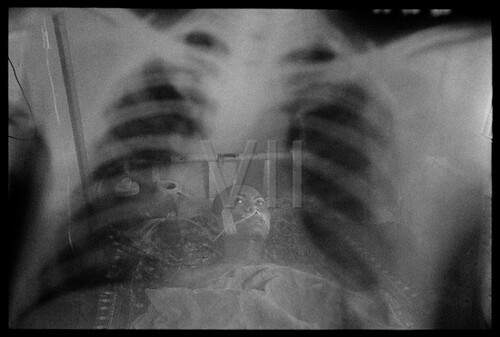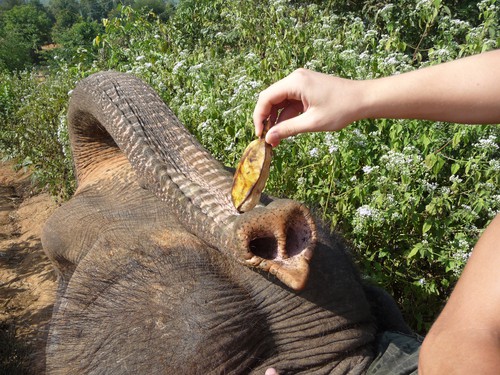 |
| Foreign tourist hand feeding Sambo (Phnom Penh Post) |
Does Sambo have Tuberculosis? None knows.
She was never tested, we dont know if her owner Sin Sorn, his family, or his nephew working as Sambos mahout was tested. But statistically, she most likely was heavily exposed to Tuberculosis, and she and all humans in daily close interaction, should be checked ASAP.
Recently, 17th of December, she was used at christmas mascot at a christmas event in Phnom Penh, called Santa Elephant Parade:.
People will gather at the Kids Park at Wat Phnom at 7:45am. At 8am, Santa will arrive on his elephant and the parade will begin. The parade will be led by 20 children from The Future Light Organisation, which runs an orphanage for more than 280 orphans which aims to help them the skills necessary to lift themselves out of poverty towards a brighter future At the end of the parade, Santa will be handing out gifts to all the children whilst people on the parade can help feed Sombo a well deserved healthy meal. The event, organised by Monument Books and Toys, is part of their regular calendar of children’s events and activities, which has included, face painting, magic shows, storytelling and origami.
Did anyone catch Tuberculosis from Sombo as christmas present? We dont know...

Pulmonary Tuberculosis is a medical problem which is a sleeping bomb in regards to captive elephants in Asia. TB is airborne and spreads through tiny droplets in the air. Besides people and elephants, tuberculosis also affects primates, cattle, horses and other animals.
It is thought that among Asias captive elephants, 5-25% suffer from Tuberculosis. Many of those elephants are kept in forest camps and have minor interaction with other humans than their mahout. But 40% elephants in some temples in India are reported to have Tuberculosis. Why?
Asias forest camps are completely different to the case with the elephants in urban environment, being handfed from hundred of people every day, like the single elephant Sambo in Phnom Penh, who have been standing as a monument outside Wat Phnom temple since 1992, and the hour walk home along the Riverside.
Through the banana hand feeding, or just checking people up, if the have food in their hands, Sambo has been exposed to hundred of thousands of people, 64% of them having TB...
 |
| Sambo handfed from staff at a restuarant in Phnom Penh |
Actually, during the 1,5 hours daily walk home, Sambo has been handfed by restaurant staff at the most populair resturants along the Ton Le Sap.
Maybe, maybe, very much maybe the waitors washed their hands afterwards??
But not their lungs...
Some minutes later they served a tourist a meal..
Cambodia ranks 21st on the list of 22 high-burden tuberculosis (TB) countries in the world. An estimated 64 percent of Cambodians are infected with TB, and a substantial number of cases remain undetected. As of 2007, around 13,000 Cambodians have died annually from the disease. There were almost 71,000 new TB cases in Cambodia in 2006, with an estimated incidence rate of 495 cases per 100,000 population
Alarmingly, 4.3 percent
of new human TB cases worldwide are now multi-drug resistant (MDR TB)
(Shah 2007). More than 50 percent of drug resistant TB cases are fatal, even when
treatment is administered (American Lung Association 2007). The incidence
of XDR TB is increasing. In the initial reported outbreak of XDR TB, 52 of
53 patients died within three weeks (WHO 2006).
Between 1994 and 2006, there have been 36 culture-confirmed cases of tuberculosis in U.S. elephants, most of them asian elephants. Among all US elephants, ≈12% of Asian and ≈2% of African elephants are thought to be infected with M. tuberculosis (Source 1,2).
Looking on this picture, seing the person protecting himself with a mask, may rise the question, when did you last time read a sign in an asian elephant sanctuary or camp, "We are TB-free!".
Many foreign tourists, especially western females visiting elephant camps and sanctuaries in Asia, tend to try to have as mouch body contact with the elephants as possible. (And some 5-10% with the mahouts as well...) This includes hand feeding, and close contact, when the elephants normally check the tourist up with their trunks, looking for food, or just checking the breath and smell of the human elephant lovers. And theres a lot of kissing, and excited laughs, and Oh-My-Gooods etc...
Its impossible to hand feed an elephant without facing the risk of Tuberculosis transfer in Asia.
When the elephant takes your gift, you get exposed to saliva from the trunk, and air from its lungs.
A second later, the fruit is gently placed on the elephants toungue, with the trunk.
And then trunk moves to the tourist again, for next fruit.
Would you step into a hospital in Asia, and kiss the patents?
 |
| Caption: An elephant moves in for a slobbery kiss. Source: |
When you and your children spend a week in an elephant sanctuary, did you check if they are TB testing their elephants and their mahouts?
Did you test yourself later? Or your children?
Furthermore; when Asian countries start to demand TB checkup on captive elephants in camps and sanctuaries, and eventually promting them to establish quarantine, and stopping human visitors and interactions, how many will continue to "save" and "rescue" elephants, when no dollars are coming in from the tourists?
And how can the camps be trusted, unless they publish veterinary reports, issued by officials?
One example is one of Thailands most visited camps, "The Elephant Nature Park", owned by Mrs Lek Sailert in Chiang Mai, and marketed as a "sanctuary", which has had a turnover of more than 70 elephants through the years. This place even sell elephant kissing, to well paying tourists.
How is the TB situation at Thailands most visited elephant camp, where you can even get a kiss from an elephant if you pay well? -The answer is, you can not find out what risks visitors to <em>The Elephant Nature Park</em> take, when they interact with the elephants. Does anyone else, apart from Mrs Sangduen Chailert, and , believe its enough to "isolate" an elephant, if its postive for Tuberculosis, in a place with a +70 elephants turnover throughout the years, 16 deaths with no public autopsy reports, and apr 100 international visitors daily, included children? ENP has a very intensive physical contact between humans and elephants, including a special kiss-an-elephant event? Read Lek Chailerts statement, where she writes: "We open our park to university and international veterinarians and the government to regularly test our elephants for TB.".
BUT! Thailand’s most well-known specialists on TB, a scientist from Chiang Mai University, wrote me 20th of May 2013: “They used to ask me the possibility to do the test, but after that I have heard nothing.” Lek Chailert writes: "Tuberculosis is a concern at our park, however none of our elephants has the disease" WHERE is public documentation from Thai official veterinaries that confirm that NOONE of the 70 elephants carried TB?
 |
| Sambo hand fed at Wat Phnom |
- Elephant TB (Mycobacterium tuberculosis) .
- Elephant TB FAQ by elephantcare.org
- Elephants can transmit TB to humans. The study, “Elephant-to-Human Transmission of Tuberculosis, 2009,” appears in the March issue of the CDC journal Emerging Infectious Diseases. It describes the 2009 outbreak of tuberculosis skin test conversions among eight employees at an elephant refuge in Tennessee.
 |
| Sambo being handfed. |
- India elephant blessings 'to stop' over tuberculosis fears Indian temples have been asked to stop their elephants from blessing Hindu pilgrims after fears were raised that the tourists were passing tuberculosis to the animals
- Tuberculosis in Cambodia.
- Cambodian TB Patients - Coughing in Cambodia (news article)
- The StopTB Partnership (www.STOPTB.com) has adopted the slogan “TB Anywhere Is TB Everywhere” to emphasize that we must develop strategies to control human TB worldwide.








This comment has been removed by a blog administrator.
ReplyDeleteI have been to The Elephant Nature Park and they do not sell elephant kisses. I did get a kiss from an elephant, but I did not pay for it.
ReplyDeleteAt least in the past, the kisses were marketed, and bought. On the other side, I guess you paid visitor fee, or more for staying as volunteer? Heres my latest blog article about Elephant Nature park : http://dankoehl.blogspot.com/2016/03/my-visit-to-sangduen-lek-chailert-and.html
ReplyDelete